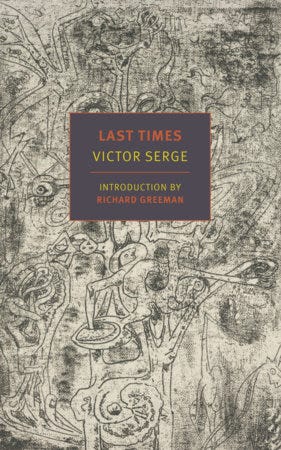Reading, Watching 08.27
Victor Serge's Novel of Fate and Exile
Below is a review of the New York Review Books re-issue of Victor Serge’s Last Days, which I was asked to write for a magazine that shall remain nameless. They never got around to editing it (or paying me for it) so I’ve decided to just share it with you here, raw and un-edited. Hope you enjoy!
“Everything doesn’t collapse all at once,” these are the lines that begin Last Times, Victor Serge’s 1946 novel dealing with the Fall of France. They introduce a grubby Parisian quartier still going about its quotidian business as war looms. If anybody knew the ins and outs of collapses and catastrophes it was Serge: he had seen the world end a few times. By the time of his flight from Paris to Marseille that formed the basis of the book, he was 53 and had been on the run nearly his entire life, narrowly dodging the cops, bullets, Stalin’s purges, and then Hitler’s tanks and bombers. He didn’t always get away. A good portion of his life was spent in prisons, camps, or in exile in remote and desolate places. When not running or captive, he fought: alongside striking anarcho-syndicalist workers in Barcelona, as a political officer in the Petrograd Soviet during the Russian Civil War, in the Communist International as a revolutionary agent abroad, as part of the doomed opposition against Stalin, and then, in exile again, continuing his lonely and dangerous campaign by writing against the rise of both Soviet totalitarianism and Fascism.
Serge wrote Last Times,—Dernier Temps, first released as The Long Dusk—in Mexico, his final refuge. Following the path of a ragtag group of refugees from Paris to Marseille, and then either into the Resistance or across the sea, the novel is a philosophical potboiler, deliberately geared towards commercial success he needed to survive, but also containing the sum of his experience and a testament of his personal creed. That philosophy was armed humanism, a demand that human dignity be defended not only in word but in deed; Serge’s vocation was resistance as a form of life, a moral imperative beyond any specific struggle, encompassing both political revolt and something more elemental and physical: an existence defined by constant tension and striving against the crushing weight of history.


